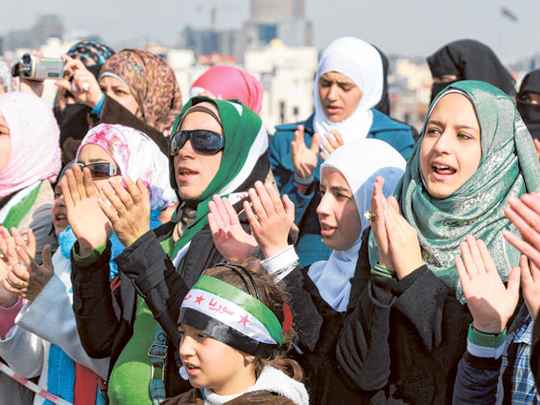
Damascus: Moscow backtracked yesterday on comments made by a top diplomat admitting that Syrian rebels might defeat its long-time ally Damascus even as Washington ordered 400 troops to near the border with Turkey.
A foreign ministry spokesman insisted that Moscow’s controversial support for President Bashar Al Assad’s regime was unchanged and that Thursday’s remarks by Deputy Foreign Minister Mikhail Bogdanov did not reflect official policy.
But Washington swiftly welcomed Bogdanov’s remarks and announced its troop deployment as US Defence Secretary Leon Panetta flew to an air base in southeastern Turkey not far from the frontier where the rebels have rear bases.
Bogdanov’s comments, which were reported by several Russian news agencies, had appeared to mark a major change in policy by Moscow, which has repeatedly used its veto powers in the UN Security Council to shield its Cold War ally.
But foreign ministry spokesman Alexander Lukashevich insisted on Friday there was no such shift. “We have never changed our position and we never will,” he said.
The United States had welcomed the apparent change, saying it appeared Russia was “finally waking up to the reality.”
Lukashevich retorted that “we were never sleeping to begin with.”
Panetta accompanied his announcement of the deployment of US troops to Turkey with an order to send two Patriot anti-missile batteries to supplement those already offered by Germany and the Netherlands.
As rebel fighters have taken control of large swathes of northern Syria along Nato member Turkey’s southern flanks, there has been mounting stray fire across the frontier, some of it deadly, stoking fears of a major escalation.
Western governments resisted a Turkish call earlier this year for a Libyan-style no-fly zone to create a buffer zone at the border, but have expressed strong support for the key alliance member.
Turkey is a “very strong ally,” Panetta’s spokesman said as the Pentagon chief flew into the Incirlik air base.
“The secretary, as we are en route to Turkey, has signed an order that will deploy some 400 US personnel to Turkey to support two Patriot missile batteries,” he told accompanying reporters.
“We expect them to be deployed in the coming weeks.”
Germany and the Netherlands have also agreed to provide advanced “hit-to-kill” Patriot weapons, which are designed to knock out cruise and ballistic missiles as well as aircraft.
The move coincides with rising fears the Syrian regime may resort to using chemical weapons against rebel forces and after Assad’s army unleashed Scud missiles in recent days.
US and European leaders have warned the Al Assad regime not to use its arsenal of chemical arms, calling it a “red line” that would trigger international military action.
Turkey has vowed to defend its territory after cross-border fire wounded civilians and following the downing of one of its warplanes.
The Patriot, or “Phased Array Tracking Radar to Intercept on Target,” came into its own during the 1991 Gulf war when it was deployed to protect allies and US forces from Iraqi Scud missiles.
The Patriot’s boxy launch units became instantly recognisable in television footage of the conflict.
On the ground on Friday, regime forces bombarded southern districts of Damascus a day after two deadly car bombings near the capital, the Syrian Observatory for Human Rights said.
“Several blasts rang out in Damascus as southern areas of the city were bombarded,” said the Britain-based group which relies on a countrywide network of activists and doctors in compiling its reports and tolls.
On Thursday at least 135 people were killed across the country, the Observatory reported, bringing the overall to more than 43,000 toll since the start of the uprising in March last year.












